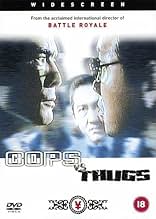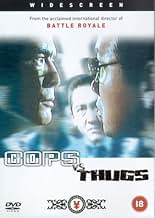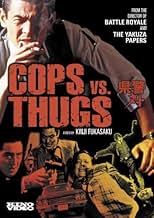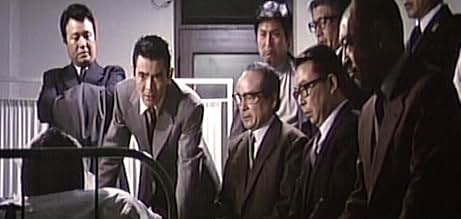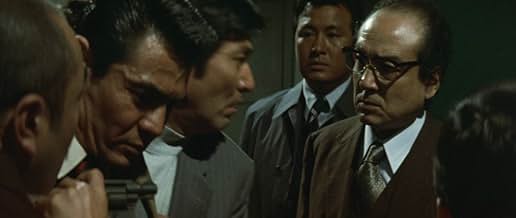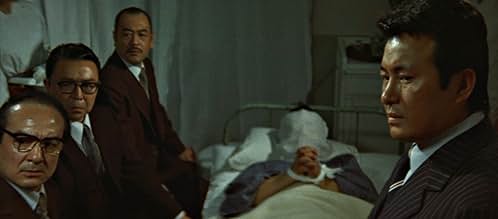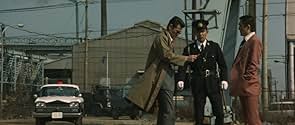AVALIAÇÃO DA IMDb
7,2/10
1 mil
SUA AVALIAÇÃO
Adicionar um enredo no seu idiomaActing boss Hirotani of the Ohara gang uses his friendship with corrupt cop Kuno to usurp a staged land deal that rival yakuza gang Kawade had arranged through local politicians. Open warfar... Ler tudoActing boss Hirotani of the Ohara gang uses his friendship with corrupt cop Kuno to usurp a staged land deal that rival yakuza gang Kawade had arranged through local politicians. Open warfare erupts between the two gangs.Acting boss Hirotani of the Ohara gang uses his friendship with corrupt cop Kuno to usurp a staged land deal that rival yakuza gang Kawade had arranged through local politicians. Open warfare erupts between the two gangs.
- Prêmios
- 2 vitórias no total
Avaliações em destaque
There's lots going on here in addition to the sex and violence that you'd expect. It's harsh, and deals with codes and honour in interesting ways. Think of it like a Japanese Scorcese picture and you'll get it. Works well.
I should start by noting that "Kenkei tai soshiki boryoku" ("Cops vs Thugs" in English) is both the first yakuza movie that I've ever seen and the first Kinji Fukasaku movie that I've ever seen. What an impressive one. This look at a war between rival gangs over a piece of land getting auctioned is one of the grittiest movies that I've ever seen. The protagonist is a cop in the pocket of one of the gangs. We don't tend to think of Japan as a crime-ridden society, but we forget that it still has organized crime (which can actually exist anywhere). This movie shows just how much the authorities were in tow to the yakuza.
I now hope to see Fukasaku's other movies. They'll be hard-pressed to be as intense as this one, but I suspect that they'll be fine pieces of work. In the meantime, check this one out.
I now hope to see Fukasaku's other movies. They'll be hard-pressed to be as intense as this one, but I suspect that they'll be fine pieces of work. In the meantime, check this one out.
The film is the Japanese answer to American mafia movies.
The director Kinji Fukasaku also knowed for his recent successfull movie "Battle Royale", began his carrer with Yakuza's movies being the most representative director of the genre and considered like the master of this kind of films, inspiring well-known authors like Kitano and Miike. In "cops vs thugs" he breaks the thin border between cop and thugs and mix them in a violent and corrupted world, being difficult to know who is the good or bad guy. Perhaps because everyone have two faces.
The actors play a good performance and the main character plays a superb role struggling between the law and common sense, he alone against the world like inspector Harry Callahan, but the humanity of the character consist in his doubts.
The plot of the movie isn't very original, landscape speculation, but for the movie don't have any importance. Also the music inspired in American movies of seventies give more dinamism to action scenes.
In conclusion a good movie highly recommended to genre fans, where no one is free of guilty, that can be summarize with a line from the script: "Gangsters and cops are the same. They both respect codes and laws."
8/10
The director Kinji Fukasaku also knowed for his recent successfull movie "Battle Royale", began his carrer with Yakuza's movies being the most representative director of the genre and considered like the master of this kind of films, inspiring well-known authors like Kitano and Miike. In "cops vs thugs" he breaks the thin border between cop and thugs and mix them in a violent and corrupted world, being difficult to know who is the good or bad guy. Perhaps because everyone have two faces.
The actors play a good performance and the main character plays a superb role struggling between the law and common sense, he alone against the world like inspector Harry Callahan, but the humanity of the character consist in his doubts.
The plot of the movie isn't very original, landscape speculation, but for the movie don't have any importance. Also the music inspired in American movies of seventies give more dinamism to action scenes.
In conclusion a good movie highly recommended to genre fans, where no one is free of guilty, that can be summarize with a line from the script: "Gangsters and cops are the same. They both respect codes and laws."
8/10
Acting boss Hirotani (Hiroki Matsukata) of the Ohara gang uses his friendship with corrupt cop Kuno (Bunta Sugawara) to usurp a staged land deal that rival yakuza gang Kawade had arranged through local politicians. Open warfare erupts between the two gangs.
By 1975, Kinji Fukasaku had made more than 30 films, most if not all of this daunting number in the Toei studio system. Returning to the screen after completing their "Battles Without Honor and Humanity" series together, Fukasaku joined forces once again with screenwriter Kazuo Kasahara, composer Toshiaki Tsushima and star Bunta Sugawara.
We have a story where the corruption is so deep, it almost seems normal. It has been suggested that the title, "Cops Versus Thugs", is meant to imply "Cops as Compared to Thugs" rather than "Cops Fighting Thugs". This would be a wise and apt distinction, as the cops are every bit as involved in the yakuza as the "thugs" in this story. Allegedly the story is loosely based on a true incident (though no one knows what incident this would be), and there is the question of whether this is pure fantasy or some sort of blunt social commentary.
Besides the film's wild violence (sort of the precursor to Takashi Miike), what really stands out is the funky 1970s score from Toshiaki Tsushima, who worked with Fukasaku on the "Honor and Humanity" films as well as many others. One of their earlier collaborations is "The Green Slime" (1968), a personal favorite that was wrongly harangued in the debut episode of Mystery Science Theater 3000.
This is "Fukasaku at the peak of his powers," writes Tom Mes, who really ought to know better than anyone. For me, the peak will always be Fukasaku's final film, "Battle Royale", perhaps simply because it was my first exposure to his work. But of his nearly countless contributions to cinema, "Cops vs Thugs" (despite this terrible English title despite the subtlety mentioned above) is one of his best, and a true joy for anyone who likes crime, action, and maybe just a pinch of sleaze.
Along with a high-definition transfer, Arrow Video brings us "Beyond the Film: Cops vs Thugs", a new 10-minute video appreciation by Fukasaku biographer Sadao Yamane and a new 12-minute visual essay on cops and criminals in Fukasaku's works by film scholar Tom Mes. Praised by many as one of the all-time greatest yakuza films, this is not to be missed.
By 1975, Kinji Fukasaku had made more than 30 films, most if not all of this daunting number in the Toei studio system. Returning to the screen after completing their "Battles Without Honor and Humanity" series together, Fukasaku joined forces once again with screenwriter Kazuo Kasahara, composer Toshiaki Tsushima and star Bunta Sugawara.
We have a story where the corruption is so deep, it almost seems normal. It has been suggested that the title, "Cops Versus Thugs", is meant to imply "Cops as Compared to Thugs" rather than "Cops Fighting Thugs". This would be a wise and apt distinction, as the cops are every bit as involved in the yakuza as the "thugs" in this story. Allegedly the story is loosely based on a true incident (though no one knows what incident this would be), and there is the question of whether this is pure fantasy or some sort of blunt social commentary.
Besides the film's wild violence (sort of the precursor to Takashi Miike), what really stands out is the funky 1970s score from Toshiaki Tsushima, who worked with Fukasaku on the "Honor and Humanity" films as well as many others. One of their earlier collaborations is "The Green Slime" (1968), a personal favorite that was wrongly harangued in the debut episode of Mystery Science Theater 3000.
This is "Fukasaku at the peak of his powers," writes Tom Mes, who really ought to know better than anyone. For me, the peak will always be Fukasaku's final film, "Battle Royale", perhaps simply because it was my first exposure to his work. But of his nearly countless contributions to cinema, "Cops vs Thugs" (despite this terrible English title despite the subtlety mentioned above) is one of his best, and a true joy for anyone who likes crime, action, and maybe just a pinch of sleaze.
Along with a high-definition transfer, Arrow Video brings us "Beyond the Film: Cops vs Thugs", a new 10-minute video appreciation by Fukasaku biographer Sadao Yamane and a new 12-minute visual essay on cops and criminals in Fukasaku's works by film scholar Tom Mes. Praised by many as one of the all-time greatest yakuza films, this is not to be missed.
COPS VS. THUGS is a Japanese yakuza movie directed by Kinji Fukasaku, and it shares themes and stylistic trademarks with his more celebrated yakuza films, SYMPATHY FOR THE UNDERDOG, GRAVEYARD OF HONOR, STREET MOBSTER, and the five-film series, THE YAKUZA PAPERS. The big difference here, as indicated by the title, is that the protagonist is not actually a mobster, but a tough cop who has to ride herd on the yakuza in his town. He is seen roughing up and disarming a quartet of yakuza henchmen in the opening pre-credits scene, thus establishing his tough guy credentials. Detective Kuno is played by veteran yakuza star Bunta Sugawara and we soon learn that, despite his fearlessness, the character is very much in the pocket of a local yakuza gang, having shielded one of its bosses from a murder charge six years before the events depicted here (reportedly based on a true story). So it's very much a yakuza film in the spirit of Fukasaku's other genre outings. Like them, it's got short sharp bursts of bloody, messy action—shootouts, stabbings, raids on rival turf, beatings of suspects, etc.--all handled in chaotic fashion, just like real-life violence. You won't find fancy fight choreography here or cleanly staged shootout sequences with montage editing. We get lots of long, unbroken takes and, during action scenes, some hand-held camera and zoom shots.
The backdrop for the events on screen is a land auction which the rival gangs are both hoping to manipulate to their benefit. But the real story involves the big monkey wrench that's thrown into Kuno's operation when Detective Kaida (Tatsuo Umemiya), a young crusading officer with judo skills and a college degree, takes over the squad to clean up the city and root out the yakuza. This puts Kuno in quite a bind. In an American cop thriller, Detective Kaida would be the protagonist and Kuno would be the villain. But it's clear that Fukasaku's sympathies lie with Kuno, who recalls starving after the war when the cops took all the black market rice for themselves and he resolved to grow up to be a "snatcher" himself. The cops in this town have figured out how to co-exist with the yakuza, tamping down their excesses and using designated scapegoats to serve prison sentences while allowing business-as-usual to continue. It's as if Sidney Lumet's film, SERPICO (1973), about whistle-blowing NYPD cop Frank Serpico, had been remade from the point-of-view of one of the corrupt cops, with Serpico as an antagonist. (Come to think of it, Lumet's 1981 follow-up, PRINCE OF THE CITY, is actually closer in spirit to Fukasaku's film than to SERPICO.) Fukasaku often spoke in interviews of the damage the war did to people's psyches and moral behavior and his films often addressed these issues. His last film, BATTLE ROYALE (2000), was a direct response to the way his generation of young people—teenagers during the war--was treated by the military dictatorship.
There are a number of women characters but their parts are all brief and they're basically just sex objects or floor mats to be walked on by the men. Reiko Ike, the sexy star of SEX AND FURY and FEMALE YAKUZA TALE, has a small role as a compliant gang moll assigned to Kuno to keep him company while he's separated from his wife.
COPS VS. THUGS was made in 1975 but is set in 1963. There doesn't seem to be much of an effort to recreate period detail. The cars and the fashions all seem to be from the 1970s. There is a scene where a black-and-white TV is on in an apartment and a singer is shown performing a sentimental ballad which is heard on the soundtrack as an attacker with a knife breaks in and stabs one of the occupants. The song sounds to me like it could indeed have been a popular hit in the early '60s. I wish I knew what the title is and who is singing it on TV in the scene.
I like the ending of this film, in which Kuno has to finally take some decisive action, even though it tears him apart to do so. There's an interesting postscript too, with an inevitable twist. However, I never felt much sympathy for Kuno. By any objective standard, he's a bad guy, a corrupt cop who stands in the way of good cops trying to do their job. One can make all kinds of allowances for him, given the explicit social and cultural contexts so ably supplied by Fukasaku, but that doesn't make me like this guy or feel he can be redeemed. Still, one has to give credit to Fukasaku for trying to challenge our assumptions. He never makes it easy for us.
The backdrop for the events on screen is a land auction which the rival gangs are both hoping to manipulate to their benefit. But the real story involves the big monkey wrench that's thrown into Kuno's operation when Detective Kaida (Tatsuo Umemiya), a young crusading officer with judo skills and a college degree, takes over the squad to clean up the city and root out the yakuza. This puts Kuno in quite a bind. In an American cop thriller, Detective Kaida would be the protagonist and Kuno would be the villain. But it's clear that Fukasaku's sympathies lie with Kuno, who recalls starving after the war when the cops took all the black market rice for themselves and he resolved to grow up to be a "snatcher" himself. The cops in this town have figured out how to co-exist with the yakuza, tamping down their excesses and using designated scapegoats to serve prison sentences while allowing business-as-usual to continue. It's as if Sidney Lumet's film, SERPICO (1973), about whistle-blowing NYPD cop Frank Serpico, had been remade from the point-of-view of one of the corrupt cops, with Serpico as an antagonist. (Come to think of it, Lumet's 1981 follow-up, PRINCE OF THE CITY, is actually closer in spirit to Fukasaku's film than to SERPICO.) Fukasaku often spoke in interviews of the damage the war did to people's psyches and moral behavior and his films often addressed these issues. His last film, BATTLE ROYALE (2000), was a direct response to the way his generation of young people—teenagers during the war--was treated by the military dictatorship.
There are a number of women characters but their parts are all brief and they're basically just sex objects or floor mats to be walked on by the men. Reiko Ike, the sexy star of SEX AND FURY and FEMALE YAKUZA TALE, has a small role as a compliant gang moll assigned to Kuno to keep him company while he's separated from his wife.
COPS VS. THUGS was made in 1975 but is set in 1963. There doesn't seem to be much of an effort to recreate period detail. The cars and the fashions all seem to be from the 1970s. There is a scene where a black-and-white TV is on in an apartment and a singer is shown performing a sentimental ballad which is heard on the soundtrack as an attacker with a knife breaks in and stabs one of the occupants. The song sounds to me like it could indeed have been a popular hit in the early '60s. I wish I knew what the title is and who is singing it on TV in the scene.
I like the ending of this film, in which Kuno has to finally take some decisive action, even though it tears him apart to do so. There's an interesting postscript too, with an inevitable twist. However, I never felt much sympathy for Kuno. By any objective standard, he's a bad guy, a corrupt cop who stands in the way of good cops trying to do their job. One can make all kinds of allowances for him, given the explicit social and cultural contexts so ably supplied by Fukasaku, but that doesn't make me like this guy or feel he can be redeemed. Still, one has to give credit to Fukasaku for trying to challenge our assumptions. He never makes it easy for us.
Você sabia?
- CuriosidadesPresident of Toei Okada Yusuke came up with the title of the film while on the toilet.
- Cenas durante ou pós-créditosOpening credits play over exposition explaining the current state of the yakuza within the city and their history.
- ConexõesFeatured in Beyond the Film: Cops vs Thugs (2017)
Principais escolhas
Faça login para avaliar e ver a lista de recomendações personalizadas
Detalhes
- Tempo de duração1 hora 40 minutos
- Mixagem de som
- Proporção
- 2.35 : 1
Contribua para esta página
Sugerir uma alteração ou adicionar conteúdo ausente


